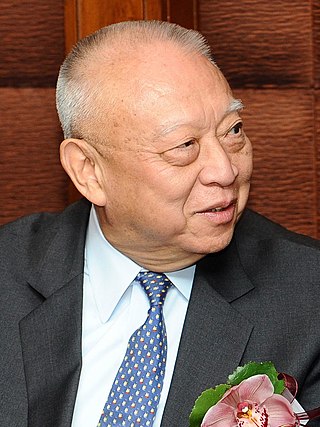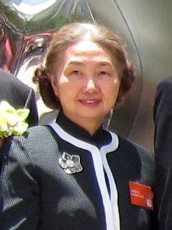
Tung Chee-hwa is a Hong Kong businessman and retired politician who served as the first Chief Executive of Hong Kong between 1997 and 2005, upon the transfer of sovereignty on 1 July. He served as a vice chairman of the Chinese People's Political Consultative Conference (CPPCC) between 2005 and 2023.

The Government of the Hong Kong Special Administrative Region, commonly known as the Hong Kong Government or HKSAR Government, is the executive authorities of Hong Kong. It was formed on 1 July 1997 in accordance with the Sino-British Joint Declaration of 1983, an international treaty lodged at the United Nations. This government replaced the former British Hong Kong Government (1842–1997). The Chief Executive and the principal officials are appointed by the State Council of the People's Republic of China. The Government Secretariat is headed by the Chief Secretary of Hong Kong, who is the most senior principal official of the Government. The Chief Secretary and the other secretaries jointly oversee the administration of Hong Kong, give advice to the Chief Executive as members of the Executive Council, and are accountable for their actions and policies to the Chief Executive and the Legislative Council.

The Liberal Party (LP) is a pro-Beijing, pro-business, and conservative political party in Hong Kong. Led by Tommy Cheung and chaired by Peter Shiu, it holds four seats in the Legislative Council, and holds five seats in the District Councils.

The chief executive of the Hong Kong Special Administrative Region is the representative of the Hong Kong Special Administrative Region and head of the Government of Hong Kong. The position was created to replace the office of governor of Hong Kong, the representative of the monarch of the United Kingdom during British rule. The office, stipulated by the Hong Kong Basic Law, formally came into being on 1 July 1997 with the handover of Hong Kong from the United Kingdom to the People's Republic of China.

Sir Donald Tsang Yam-kuen is a former Hong Kong civil servant who served as the second Chief Executive of Hong Kong from 2005 to 2012.

Anson Maria Elizabeth Chan Fang On-sang, is a retired Hong Kong politician and civil servant who was the first ethnic Chinese and woman to serve as Chief Secretary, the second-highest position in both the British colonial government and the Hong Kong SAR government under the Chinese sovereignty from 1993 until she retired from the government in 2001, sparking speculations of her growing rift with Chief Executive Tung Chee-hwa.

The Democratic Alliance for the Betterment and Progress of Hong Kong (DAB) is a pro-Beijing conservative political party registered since 1992 in Hong Kong. Chaired by Gary Chan and holding 13 Legislative Council seats, it is currently the largest party in the legislature and in terms of membership, far ahead of other parties. It has been a key supporting force to the SAR administration and the central government's policies on Hong Kong.

The Executive Council of Hong Kong (ExCo) is the cabinet of the Government of Hong Kong, acting as a formal body of advisers to the Chief Executive of Hong Kong that serves as a core policy-making organ assisting the Chief Executive. It is analogous to other Executive Councils in the Commonwealth such as the Federal Executive Council of Australia, the Executive Council of New Zealand, and the Privy Council of the United Kingdom.

James Tien Pei-chun, GBS, OBE, JP is the former chairman and Leader of the Liberal Party (LP) and former member of the Legislative Council of Hong Kong (Legco). Originally an entrepreneur, he was also a non-official member of the Executive Council of Hong Kong (Exco), member of Central and Western and Kwai Tsing District Council and Hong Kong member to the Chinese People's Political Consultative Conference (CPPCC).
Sir Ti-liang Yang, was a Hong Kong judge. He was the Chief Justice of Hong Kong from 1988 to 1996, the only ethnic Chinese person to hold this office during British colonial rule.

Elections in Hong Kong take place when certain political offices in the government need to be filled. Hong Kong has a multi-party system, with numerous parties in the Legislative Council. The Chief Executive of Hong Kong is nonpartisan but has to work with several parties to form a coalition government.

Elsie Leung Oi-sie, GBM, JP is a Hong Kong politician and solicitor. She was Secretary for Justice of Hong Kong from 1997 to 2005 and a member of the Executive Council of Hong Kong.

Lam Woon-kwong is a Hong Kong politician and civil servant who has worked as convenor of the Executive Council and chairperson of the Equal Opportunities Commission.

Patrick Ho Chi-ping is a Hong Kong ophthalmologist turned politician.

The 2005 Hong Kong Chief Executive election was held to fill the vacancy of the territory's top office. Then Chief Executive Tung Chee-hwa submitted his resignation to the central government in Beijing, and was officially approved on 12 March. As Donald Tsang, Chief Secretary for Administration in Tung's cabinet, was the only candidate, he was declared elected unopposed on 16 June. Tsang took office on 21 June to begin his first two-year term.

Principal Officials Accountability System, commonly referred to as the Ministerial system, sometimes the Accountability System, was introduced in Hong Kong by chief executive Tung Chee Hwa in July 2002. It is a system whereby all principal officials, including the Chief Secretary, Financial Secretary, Secretary for Justice and head of government bureaux would no longer be politically neutral career civil servants. Instead, they would all be political appointees chosen by the chief executive.

The 2000s in Hong Kong began a new millennium under the People's Republic of China (PRC).

The 2002 Hong Kong Chief Executive election was to select the second term of the Chief Executive (CE) of the Hong Kong Special Administrative Region (HKSAR). Incumbent Tung Chee-hwa was nominated by the 800-member Election Committee (EC) without competition.

The Second term of Tung Chee-hwa as Chief Executive of Hong Kong, or Tung administration, officially considered part of "The 2nd term Chief Executive of Hong Kong", relates to the period of governance of Hong Kong since the transfer of sovereignty over Hong Kong, between 1 July 2002 and 12 March 2005 until Tung Chee-hwa resigned from the office and the rest of the term was taken up by former Chief Secretary for Administration Donald Tsang.

The First term of Tung Chee-hwa as Chief Executive of Hong Kong, officially considered part of "The 1st term Chief Executive of Hong Kong", relates to the period of governance of Hong Kong since the transfer of sovereignty over Hong Kong, between 1 July 1997 and 30 June 2002. Tung Chee-hwa was elected in 1996 by 400-member Selection Committee as the first Chief Executive of Hong Kong.











